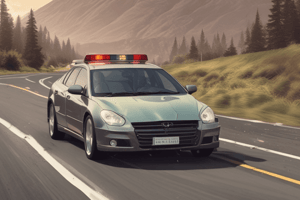Podcast
Questions and Answers
What is the primary goal of defensive driving?
What is the primary goal of defensive driving?
- To drive aggressively and assertively on the road.
- To react impulsively to unexpected situations on the road.
- To predict and prevent dangerous situations while driving. (correct)
- To ignore the actions of other drivers.
Which of the following is NOT a core component of defensive driving according to the text?
Which of the following is NOT a core component of defensive driving according to the text?
- Reacting accordingly to avoid collisions
- Speeding up to get ahead of other vehicles (correct)
- Maintaining a safe following distance
- Anticipating potential hazards
Why is maintaining a safe following distance important in defensive driving?
Why is maintaining a safe following distance important in defensive driving?
- To listen to music clearly
- To reduce fuel consumption
- To allow for quick evasive maneuvers in emergencies (correct)
- To intimidate the driver in front
What differentiates defensive driving from other driving approaches?
What differentiates defensive driving from other driving approaches?
What is one benefit of defensive driving mentioned in the text?
What is one benefit of defensive driving mentioned in the text?
Which of the following is NOT recommended in the text as a defensive driving tip?
Which of the following is NOT recommended in the text as a defensive driving tip?
What is the purpose of proper lane positioning in defensive driving?
What is the purpose of proper lane positioning in defensive driving?
How does defensive driving help in minimizing the impact of accidents?
How does defensive driving help in minimizing the impact of accidents?
Which behavior is considered aggressive driving according to the text?
Which behavior is considered aggressive driving according to the text?
Why is it important to stay alert while driving defensively?
Why is it important to stay alert while driving defensively?
What is a potential consequence of the new feature for Bing Chat discussed in the text?
What is a potential consequence of the new feature for Bing Chat discussed in the text?
How might the rise of plugins for AI chatbots impact the future of work?
How might the rise of plugins for AI chatbots impact the future of work?
What is the purpose of adding '#no_search' to Bing Chat queries according to the text?
What is the purpose of adding '#no_search' to Bing Chat queries according to the text?
In what way does climate change intersect with other current affairs topics according to the text?
In what way does climate change intersect with other current affairs topics according to the text?
How does the Chrome extension 'No Search For' benefit users according to the text?
How does the Chrome extension 'No Search For' benefit users according to the text?
How might the No Search feature in Bing Chat potentially affect the online services industry?
How might the No Search feature in Bing Chat potentially affect the online services industry?
In what context could Bing Chat's 'No Search' feature be particularly beneficial?
In what context could Bing Chat's 'No Search' feature be particularly beneficial?
How can staying informed about current affairs across different categories help individuals according to the text?
How can staying informed about current affairs across different categories help individuals according to the text?
Flashcards are hidden until you start studying
Study Notes
Understanding Defensive Driving and Its Importance to Road Safety
Imagine driving down the highway, traffic humming around you like a symphony of rubber and metal. In the midst of this, you encounter an unexpected situation. By drawing on your defensive driving skills, you're able to safely navigate the road, keeping yourself and others out of harm's way. This isn't just a hypothetical scenario; it's a critical aspect of road safety that every driver should strive to master.
The Concept of Defensive Driving
Defensive driving is a proactive approach to navigating the road, focusing on predicting and preventing dangerous situations. It includes anticipating the actions of other drivers, planning for potential hazards, and reacting accordingly to avoid collisions or minimize their impact. Defensive driving isn't just a state of mind; it's a set of skills and habits that require constant practice and improvement.
Components of Defensive Driving
Defensive driving consists of several core elements that, when combined, create a safety-first driving experience. Some key components include:
- Anticipating potential hazards: Always be aware of your surroundings, scanning for potential hazards like pedestrians, cyclists, and other vehicles.
- Maintaining a safe following distance: Leave enough room between you and the vehicle in front to allow for quick evasive maneuvers in case of an emergency.
- Using proper lane positioning: Stay in your lane and signal your intentions to others, allowing them to anticipate your actions.
- Driving to the conditions: Adapt your driving style to the road and weather conditions, slowing down or adjusting your speed as needed.
- Remaining focused: Keep your attention on the road, avoiding distractions like texting, eating, or adjusting the radio.
- Avoiding aggressive driving: Always drive at a safe and reasonable speed, avoiding sudden lane changes, stopping short, or other aggressive driving behaviors.
Why Defensive Driving Matters
Defensive driving isn't just about keeping yourself safe; it's about protecting other road users as well. By practicing defensive driving, you can:
- Prevent accidents: By anticipating and avoiding potential hazards, you reduce your risk of being involved in a collision.
- Minimize the impact of accidents: In the event of an unavoidable collision, defensive driving can help minimize the severity of the impact.
- Reduce stress: Defensive driving can help reduce the stress and anxiety associated with driving, making your commute or road trip more enjoyable.
- Set a positive example: By driving defensively, you set a positive example for other drivers, helping to create a safer driving culture.
Defensive Driving Tips
If you're looking to improve your defensive driving skills, here are a few tips to help you get started:
- Take a defensive driving course: Many organizations offer defensive driving courses that can help you improve your skills and learn new techniques.
- Practice, practice, practice: The more you practice, the better your defensive driving skills become. Consider incorporating defensive driving techniques into your daily commute.
- Stay informed: Keep up to date on road and weather conditions, as well as any changes to local traffic laws and regulations.
- Remain alert: Always be on the lookout for potential hazards, whether you're driving down a busy highway or navigating a quiet residential street.
In conclusion, defensive driving is an essential tool for maintaining road safety, reducing the risk of accidents, and minimizing the impact of collisions. By practicing defensive driving techniques, you can protect yourself and others, making our roads a safer place. As you develop your defensive driving skills, remember to stay alert, focus on the road, and always drive to the conditions.
Studying That Suits You
Use AI to generate personalized quizzes and flashcards to suit your learning preferences.





